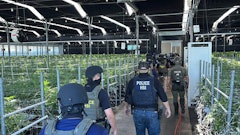
Editor's note: This article was updated Jan. 4, 2024, to include comments from the California Department of Tax and Fee Administration.
If a vape pen is sold for $40 at a California cannabis dispensary but only contains $5 of actual cannabis oil, should retailers be collecting the state’s 15% cannabis excise tax on the entire purchase?
This question is at the heart of a lawsuit filed Dec. 28 by HNHPC Inc., which operates one of Catalyst Cannabis Co.’s 26 branded dispensaries in the Golden State, where a fight to exclude “cannabis accessories” from the state’s cannabis excise tax is now in the Superior Court of California, Orange County.

“That’s really what the argument’s going to be about,” Anthony Almaz, counsel for Catalyst, told Cannabis Business Times. “What’s really taxable in California?”
For now, it’s complicated.
Almaz and litigator Jeff Augustini are the attorneys representing Catalyst in a case challenging the California Department of Tax and Fee Administration (CDTFA) and the state’s Office of Administrative Law (more on this later).
The lawsuit comes after the CDTFA adopted an emergency regulatory action in November that requires licensed dispensaries to collect the state’s 15% excise tax on not only cannabis (flower) and cannabis products (concentrates, edibles, topicals, etc.)—as outlined in state law—but also on what the department is now calling “optional” tangible personal property (TPP).
The emergency regulatory action was approved Dec. 15, 2023, by the Office of Administrative Law and will remain in effect for two years.
While it’s not found in California’s cannabis tax law, Almaz said, the optional TPP is a mechanism for the CDTFA to force excise taxation on cannabis accessories that have otherwise been exempt until now.
For example, a vaping device sold with a cartridge containing cannabis oil is “optional TPP” if the cannabis retailer’s customer can purchase the same cartridge containing cannabis oil without purchasing the vaping device, according to the CDTFA. In other words, if cannabis products and cannabis accessories are sold together as a package item, then the excise tax is to be imposed on the entire purchase under the recently approved emergency action.
This also includes any packaging a customer is required to purchase as a condition of the sale of cannabis or cannabis products, CDTFA spokesperson Tully Lehman told CBT.
"This is because the department determined that those amounts are required to be included in gross receipts based upon the terms of the retail sale and the wording of subdivision (a) of RTC [Revenue and Taxation Code] section 34011.2," Lehman said.
In the example of a $40 vape pen containing just $5 of cannabis oil, this is the difference between paying $6 in excise taxes on the whole purchase versus paying 75 cents in excise taxes on just the oil.
In this regard, the stakes are high for both bureaucrats trying to fill state coffers and businesses simply trying to turn a profit in an unrelenting regulatory climate that continues to put the licensed industry behind the eight ball. Notably, California’s cannabis excise tax has provided nearly $3 billion in state revenue since the beginning of 2018, according to the CDTFA.
As part of an ongoing struggle to compete with the untaxed and unregulated market, Catalyst has separately stated its retail charges for cannabis items and non-cannabis items on customer receipts. This has allowed the company to collect only the hypothetical 75 cents in excise taxes in the vape pen example above.
And Catalyst has been separately stating these charges for quite some time, including at its distribution facility prior to 2023, when the state’s 15% excise tax collection was imposed on distributors instead of retailers during the first five years of the adult-use program.
This practice was spelled out clearly for distributors in California’s Cannabis Tax Regulations:
“[The CDTFA] found no real problem with that,” Almaz said of Catalyst’s pre-2023 distribution methods.
Beginning in January 2023, the cannabis excise tax reporting responsibility shifted from distributors to retailers. In turn, Catalyst continued its usual separation of cannabis and non-cannabis statements but just at a different point in the supply chain: from retailer to customer rather than distributor to retailer.
But the CDTFA took issue with this as a misinterpretation of the law.
"CDTFA determined there was an issue with how cannabis retailers were applying RTC section 34011.2 and wanted to clarify what charges should be included in gross receipts," Lehman said.
The department went on to issue a notice of proposed emergency action and finding of emergency, which explained that the CDTFA determined the provisions of Regulation 3700(i) were not consistent with the state's Revenue and Taxation Code.
Almaz said this happened after the CDTFA noticed Catalyst's excise tax remittance was less than its dispensary peers in 2023 and began questioning the company's interpretation of the law.
“We said, ‘Well, we’re following the [same] regulations,’” he said.
“Nothing really changed in terms of the language of the tax law,” Almaz said. “So, the way we looked at it was, ‘OK, so long as now we separately stated on the invoice to the customer instead of the retailer, it should be the same result.”
This is not some tax loophole that Catalyst found or exploited but rather how the company has interpreted California’s cannabis tax law for several years now, he said.
“We want to make that part clear,” Almaz said, “because the tax authorities back in 2019 came out with the regulation that says, ‘Listen, cannabis accessories are not subject to the excise tax so long as they’re separately stated on the receipt and given to the purchaser.’ … The tax law didn’t change.”
But Catalyst went back and forth with CDTFA officials on its interpretation of the law as those officials were auditing the company’s retail locations in 2023, he said.
As Catalyst was appealing an audit, Almaz said, the CDTFA initiated emergency regulations in October on section 3802 (“Gross Receipts From Sales of Cannabis and Cannabis Products”) of the California Code of Regulations and on amending section 3700 (“Cannabis Excise and Cultivation Tax”).
Notably, the CDTFA amended 3700(i) to make the "non-substantive" change to add that subdivision (i) is inoperative on and after Jan. 1, 2023. This timing correlates with the excise tax switch from distributor to retailer.
The CDTFA then submitted the emergency regulatory action to the California Office of Administrative Law (OAL), the agency that’s required to review regulations to ensure they comply with the Administrative Procedures Act (APA).
The requirements set forth in the APA are designed to provide the public with a meaningful opportunity to participate in the adoption of state regulations and to ensure that regulations are “clear, necessary and legally valid,” according to the OAL.
However, Almaz claims that public participation was very much omitted from the process when CDTFA and OAL officials teamed up on adopting Regulation 3802 and amending Regulation 3700(i)—pertaining to separately stating cannabis products and cannabis accessories—in the emergency regulatory action.
“The OAL, in the end, they had about 15 days to review, and on the 15th day they tell us, ‘Oh, we approved the regulation, and we approved an amendment to Regulation 3700(i),’ which no one ever told us about, which is completely in violation of the APA, because you’re supposed to inform people what you’re going to do, in terms of a regulation, so that you give the public an opportunity to comment,” he said. “You can’t just submit a regulation for approval without ever getting public participation in.”
Almaz said the reaction from the team at Catalyst after OAL’s Dec. 15 approval was nothing short of shock, especially considering the emergency action for these regulations will remain in effect until Dec. 15, 2025.
“We’re telling the OAL, ‘How could you let them approve this regulation, and how could you let them amend another regulation without letting us know?’” Almaz said.
The team at Catalyst then submitted a public records request on Dec. 15 to try and understand what happened behind the scenes, according to the lawsuit.
The request asked for the entirety of the rulemaking file and the written communications, if any, between the CDTFA and the OAL related to the submission, and subsequent approval, of Regulation 3802 and the amendment of 3700.
The OAL provided “at least some” of the requested documents on Dec. 22, according to the lawsuit.
“As it turns out, the CDTFA and OAL were in communication with each other during the entire review process,” Almaz said. “And the OAL told them that the regulation does not satisfy the Administrative Procedures Act because it doesn’t meet the clarity standard, so you would have to amend it and update it in order to satisfy those. So, they started working with each other, sending over amended provisions for the regulations, including an amendment to 3700(i).”
Furthermore, the records request revealed that CDTFA and OAL officials “engaged in a concerted joint effort” in the final days of the OAL’s regulatory review to “fix some of the many fatal flaws” in the proposed emergency regulation, according to the lawsuit.
“Once they worked with each other, found language that they were all happy with, they approved it without ever telling anybody that they made changes to the provisions,” Almaz said. “So we’re complaining, A, that the CDTFA has no authority to make this regulation, and, B, even if they did have the authority, they weren’t allowed to because it violated the APA.”
In an interview request with CDTFA, Cannabis Business Times specifically inquired about the department’s decision to adopt and amend regulations through emergency action rather than go through the normal rulemaking process.
"The emergency rulemaking process was used to expedite the clarification of RTC section 34011.2 and intended to help retailers better understand the tax issues as soon as possible," Lehman said. "The emergency regulation will become permanent if CDTFA adopts the emergency regulation through the normal rulemaking process."
Almaz said he believes CDTFA officials were in a hurry because their emergency regulation rulemaking power ended one year after the Jan. 1, 2023, shift from distributor to retailer on collecting and remitting excise taxes.
“When the OAL told them that the regulation did not satisfy the APA, what you’re supposed to do is withdraw it, amend the language, resubmit it to the public, and then resubmit it to the OAL,” he said. “But they would’ve run out of time. … They blew the clock essentially.”
Had the CDTFA withdrawn its emergency regulatory action and instead initiated an ordinary rulemaking process, the department would have been tasked with creating financial reports to determine industry impact, among other time-consuming endeavors, Almaz said.
Should the CDTFA pursue making the emergency regulation permanent through the normal rulemaking process, then the public will have the opportunity to comment at that time, Lehman said.
With public input left out of the emergency process, however, Almaz said the team at Catalyst believes this case is nothing more than the culmination of the abuse the cannabis industry suffers as “third-class businesses” at the hands of governing agencies enforcing their own desires on the public.
The CDFTA framework for “optional” tangible personal property as a means to tax cannabis accessories is just the latest example, he said.
“They create this whole scheme out there, and essentially they’re acting like the legislature,” Almaz said. “They’re not happy with the language of the statute, so they’re interpreting it in a way that makes them feel better."
























